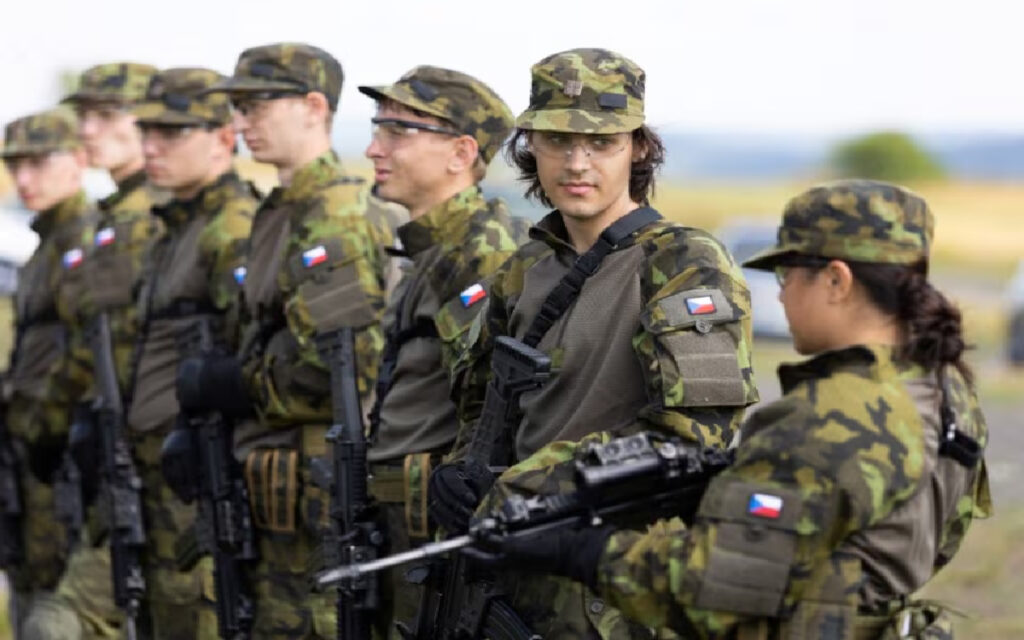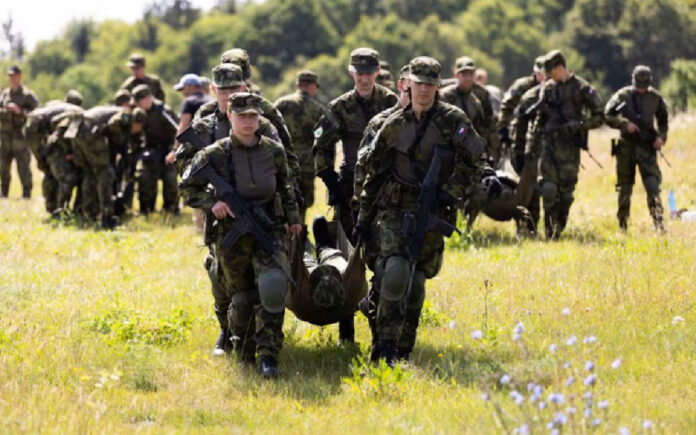Valeč: As instructors bark commands, Czech high school students participating in a pilot army program crawl through dense forest carrying combat rifles, gaining firsthand experience in military life. This initiative aims to address the Czech Republic’s persistent recruitment challenges, exacerbated by the ongoing conflict in Ukraine and the broader regional threat posed by Russia.
The Czech Republic, like many former Soviet-satellite states now in NATO, has consistently fallen short of its recruitment goals, leading to understaffed units and reduced combat readiness. The four-week training program, conducted in a closed military zone 94 km (58 miles) west of Prague, is part of an effort to inspire more young people to join the military.
General Karel Rehka, chief of the Czech armed forces, has criticized the current recruitment system as unsustainable. “We want to deter any potential adversary in the future,” Rehka told Reuters. “If we don’t do anything about the lack of human resources in the military…, it may mean that we won’t be able to preserve our peace and to deter any potential enemy.”

In recent years, Czech recruitment has seen some improvement, with figures reaching 56% of the target in 2021 and 85% in 2022. However, the problem persists across Eastern Europe, where countries like Poland, Hungary, Romania, and Slovakia share borders with Ukraine and face similar challenges in bolstering their armed forces.
“We cannot do anything without people – if we modernise equipment and don’t have enough competent and motivated people, that is all wasted money,” Rehka added.
This issue is not confined to Eastern Europe. NATO, which needs between 35 and 50 additional brigades to fully implement its defense plans, faces similar recruitment hurdles across Western Europe. For Eastern European nations, which have long been wary of Russian aggression under President Vladimir Putin, the challenge is particularly acute.
Czech former deputy defense minister Tomas Kopecny emphasized the urgency: “We also see the probability of Russian aggression against us as not impossible…within a few years. So in case Russia attacks, we need to know we can count on a certain amount of soldiers and capabilities.”
Governments are exploring various solutions, including digital marketing campaigns, increased enlistment bonuses, and policy changes. The Czech defense ministry has introduced a decree effective September 1, lowering medical requirements for career soldiers, reservists, and new recruits.
Also Read | Global Watchdog Urges India to Strengthen Bank Scrutiny for Politicians
With low unemployment rates across Eastern Europe, enticing young people to join the military for lower pay than the private sector offers is a significant challenge. Major General Karol Dymanowski, First Deputy Chief of the General Staff of Poland’s armed forces, highlighted the competitive labor market: “We have challenges. They are related to the fact that the labor market here is very competitive.”
In Poland, officials aim to meet recruitment targets and increase limits but face skepticism about the feasibility of building an army of 300,000. The country has also boosted defense spending and launched a “Holidays With the Army” program, providing basic military training over 28 days. Despite a rise in recruits, Poland saw a record 9,000 professional soldiers leave the service in 2023.
Also Read | Trump and Harris to Debate on ABC; Trump Proposes Additional Debates
Hungary’s military has initiated a media campaign, including billboards and a military-themed TV series, to attract new recruits. In Romania, enlistment drives have been launched following reports of significant unfilled positions in the armed forces. Romania’s limited operational capacity, such as having only two of four Patriot missile defense batteries operational and insufficient trained pilots for its F-16 jets, underscores the urgency of these efforts.
Romania and other nations are banking on a new generation of recruits, like Czech high school student John Dunka, who plans to enlist after participating in the summer camp. “Wearing this uniform includes a sense of pride,” Dunka said, holding an unloaded Bren 2 combat rifle during a break from drills. “With all that has happened in the world, I’m glad I can participate in a camp like this.”



